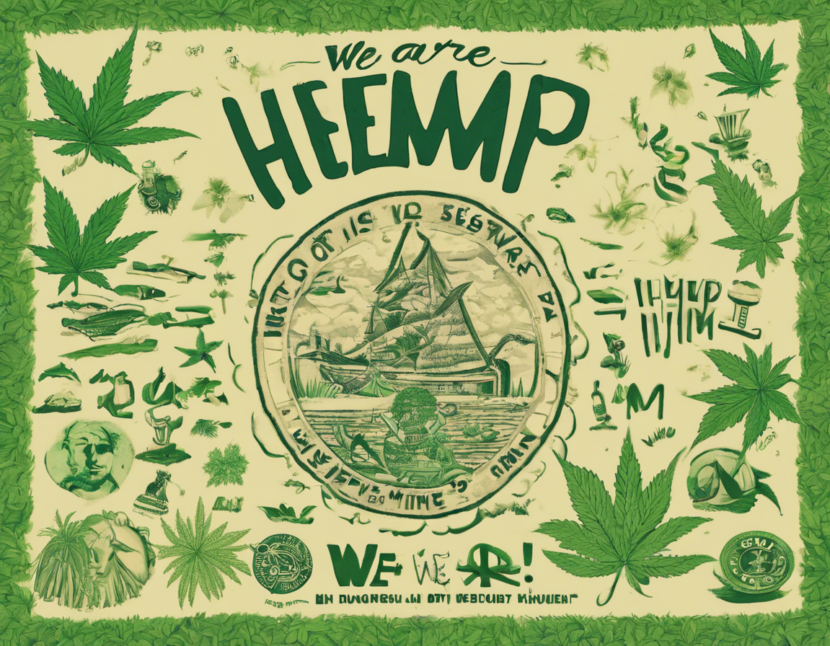Hemp, often misconstrued with marijuana, has been gaining popularity in recent years for its numerous benefits and versatile uses. This versatile plant has a vast array of applications, from textiles and construction materials to beauty products and supplements. In this comprehensive article, we will explore the benefits and uses of hemp products, shedding light on its potential and why it is becoming a favorite among consumers and industries alike.
What is Hemp?
Hemp is a variety of the Cannabis sativa plant species that is grown specifically for industrial purposes. Unlike its close relative, marijuana, hemp contains very low levels of tetrahydrocannabinol (THC), the psychoactive compound responsible for the “high” associated with marijuana. This makes hemp products non-intoxicating and safe for use in various applications.
Nutritional Benefits of Hemp
1. Rich in Nutrients
Hemp seeds are considered a superfood as they are packed with essential nutrients. They are an excellent source of protein, containing all nine essential amino acids. Additionally, hemp seeds are rich in healthy fats, including omega-3 and omega-6 fatty acids, which are beneficial for heart health.
2. Easy to Digest
Hemp seeds are easily digestible and are a great option for those with sensitive stomachs or digestive issues. They are also a good source of dietary fiber, which is essential for maintaining a healthy digestive system.
Health Benefits of Hemp Products
1. Pain Relief
CBD, a compound derived from hemp, has been shown to have pain-relieving properties. It can help manage chronic pain conditions such as arthritis, migraines, and neuropathic pain without the harmful side effects associated with traditional pain medications.
2. Reduced Anxiety and Stress
CBD is also known for its anxiolytic effects, which can help reduce anxiety and stress. Many individuals find relief from symptoms of anxiety disorders, such as generalized anxiety disorder and post-traumatic stress disorder, by using CBD products.
3. Skin Health
Hemp seed oil is a popular ingredient in skincare products due to its moisturizing and anti-inflammatory properties. It can help soothe dry, irritated skin and may even help with conditions such as eczema and psoriasis.
Environmental Benefits of Hemp
1. Sustainable Crop
Hemp is considered a sustainable crop due to its fast growth cycle and minimal need for pesticides and herbicides. It also has deep roots that help prevent soil erosion and improve soil health.
2. Carbon Sequestration
Hemp plants absorb carbon dioxide from the atmosphere during photosynthesis, making them an effective carbon sink. This can help mitigate climate change by reducing greenhouse gas levels in the atmosphere.
3. Biodegradable Products
Hemp fibers can be used to create biodegradable materials such as textiles, paper, and bioplastics. These products break down easily in the environment, reducing waste and pollution.
Industrial Uses of Hemp
1. Textiles
Hemp fibers are known for their durability and breathability, making them ideal for use in textiles. Hemp fabric is commonly used to make clothing, bags, and other accessories.
2. Building Materials
Hemp can be used to make sustainable building materials such as hempcrete, a mixture of hemp fibers, lime, and water. Hempcrete is a lightweight and insulating material that is gaining popularity in the construction industry.
3. Biofuel
Hemp seeds can be processed to produce biofuel that can be used as an alternative to fossil fuels. Hemp biofuel is renewable, cleaner burning, and produces lower emissions than traditional petroleum-based fuels.
4. Paper
Hemp fibers are suitable for making paper due to their strength and durability. Hemp paper production is more sustainable than traditional wood pulp paper production as it requires fewer chemicals and water.
Frequently Asked Questions (FAQs)
1. Are hemp products legal?
Yes, hemp products that contain less than 0.3% THC are legal at the federal level in the United States. However, regulations may vary by state and country, so it is essential to check local laws before purchasing or using hemp products.
2. Will hemp products get me high?
No, hemp products contain very low levels of THC, the psychoactive compound found in marijuana. This means that consuming hemp products will not cause a “high” feeling.
3. What is the difference between hemp and CBD?
Hemp is a plant variety, while CBD is a compound found in hemp plants. CBD can be extracted from hemp and used in various products for its therapeutic properties.
4. Are there any side effects of using hemp products?
While hemp products are generally considered safe, some individuals may experience side effects such as dry mouth, drowsiness, or changes in appetite. It is essential to consult a healthcare provider before using hemp products, especially if you are taking medications or have underlying health conditions.
5. Can hemp products be used for pets?
Yes, hemp products such as CBD oil can be used for pets to help manage conditions like anxiety, pain, and inflammation. It is crucial to use pet-specific products and consult a veterinarian before giving hemp products to your pets.
In conclusion, hemp is a versatile plant with numerous benefits and uses, ranging from nutritional and health benefits to industrial and environmental applications. As the popularity of hemp products continues to grow, it is essential to understand the potential of this remarkable plant and how it can positively impact our health, industries, and the environment. Whether you are looking for a natural remedy for pain relief, sustainable building materials, or eco-friendly textiles, hemp has something to offer for everyone.



